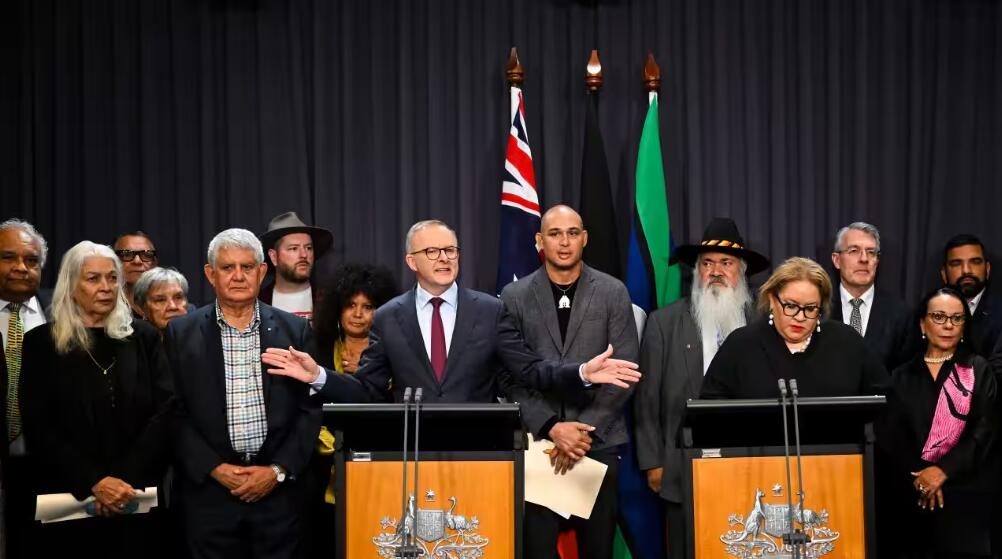The government and the Referendum Working Group also announced the proposed wording that will be altered in the Australian Constitution if a ‘yes’ vote is successful.
The question Australians will be asked to vote on at the Indigenous Voice referendum has finally been revealed, as the government prepares to introduce a bill altering the constitution to parliament.
Prime Minister Anthony Albanese says voters will be asked:
A Proposed Law: to alter the Constitution to recognise the First Peoples of Australia by establishing an Aboriginal and Torres Strait Islander Voice. Do you approve this proposed alteration?
The referendum working group, which has spent months refining the proposed referendum question, gave its advice to the Prime Minister in a meeting yesterday afternoon.
The constitutional wording
The final proposed alterations to the constitution, if a ‘yes’ vote is successful, are as follows:
“In recognition of Aboriginal and Torres Strait Islander peoples as the First Peoples of Australia:
- There shall be a body, to be called the Aboriginal and Torres Strait Islander Voice;
- The Aboriginal and Torres Strait Islander Voice may make representations to the Parliament and the Executive Government of the Commonwealth on matters relating to Aboriginal and Torres Strait Islander peoples;
- The Parliament shall, subject to this Constitution, have power to make laws with respect to matters relating to the Aboriginal and Torres Strait Islander Voice, including its composition, functions, powers and procedures.”
Mr Albanese, who became emotional at several points during the press conference, said an Indigenous Voice would be critical to closing the gap.
“Today points the way to how we are going to do it; by consulting people on the ground, by working with people who live alongside these challenges, by enshrining a Voice in our constitution and by listening to that Voice,” he said.
He confirmed that the Voice would advise both parliament and the government and would be chosen by the community without government appointments.
The Voice would be allowed to make proactive representations to the government, and the government would seek advice from the body early in the development of policy.
The constitution alteration bill will be introduced to parliament next week and a joint parliamentary committee to be established to consider any submissions, with a vote anticipated in June.

First Nations Referendum Working Group member Marcia Langton is emotional as she listens to Mr Albanese speak to the media. Source: AAP / Lukas Coch
‘If not now, when?’
Indigenous Australians Minister, Wiradjuri woman Linda Burney pleaded with the Australian people to “seize the moment.”
“If not now, when? We have been talking about recognising Aboriginal and Torres Strait Islander Australians in our founding document for decades – now we have the chance to do it.”
Assistant Minister Malarndirri McCarthy praised the “sensible” amendments.
“[They] get the balance right. They give voice to the aspirations of Aboriginal and Torres Strait Islander peoples right across the country,” the Yanyuwa woman said.
Acknowledging the journey
Professor Megan Davis, a Cobble Cobble woman, constitutional lawyer and a key creator of the Uluru Statement from the Heart, acknowledged all the work that has been done previously to constitutionally recognise First Nations people.
“Six to seven years ago, we ran 12 constitutional dialogues and a national constitutional convention and we said that a protected Voice and an enshrined Voice to the Parliament is what we think is meaningful constitutional recognition. It is symbolic
recognition and substantive recognition,” she said.
“I think it was 12 years ago when the first expert panel was set up and many of my colleagues were involved in that, but prior to that, three decades of advocacy for constitutional recognition and I acknowledge the work of Patrick Dodson, Linda Burney, Marcia Langton and many here who have contributed to this journey.”
The Coalition remains on the fence
Opposition Leader Peter Dutton said the Coalition had not decided whether it would support the Voice referendum or not.
He said the government needed to demonstrate how the change to the constitution would improve the lives of Indigenous people.
“We’ve spoken with Indigenous people on the ground, they want the details as well … some of the groups are more worried about practical action than the Voice, that’s the advice back to us,” he said.
“There’s no evidence within what the Prime Minister has put on the public record so far as to how that would work or where the practical outcomes would be.”
Mr Dutton also urged the Prime Minister to release legal advice from Australia’s second law officer.
“I think it is absolutely essential that the Prime Minister releases the Solicitor-General’s advice … in the absence of that advice, and in the absence of detail from the Prime Minister, how can the Australian public make an informed judgement about a very, very important issue?”
A ‘double yes’ needed for success
For the referendum to succeed, there will need to be a double majority Yes result. That means both a majority of national voters and a majority of states would need to vote for the constitutional change.
Special Envoy for Reconciliation and the Implementation of the Uluru Statement from the Heart, Yawuru man Patrick Dodson, said the Referendum is the “best chance we’ve ever had” to create structural change for Aboriginal and Torres Strait Islander people.
“A Voice to Parliament, enshrined in our Constitution, will mean that our people are listened to and heard on the issues that affect us.”
“The Voice will be a fearless source of advice and accountability, and it will make a practical difference.”
Only eight of the 44 referenda held since the federation has succeeded.


Leave a Reply